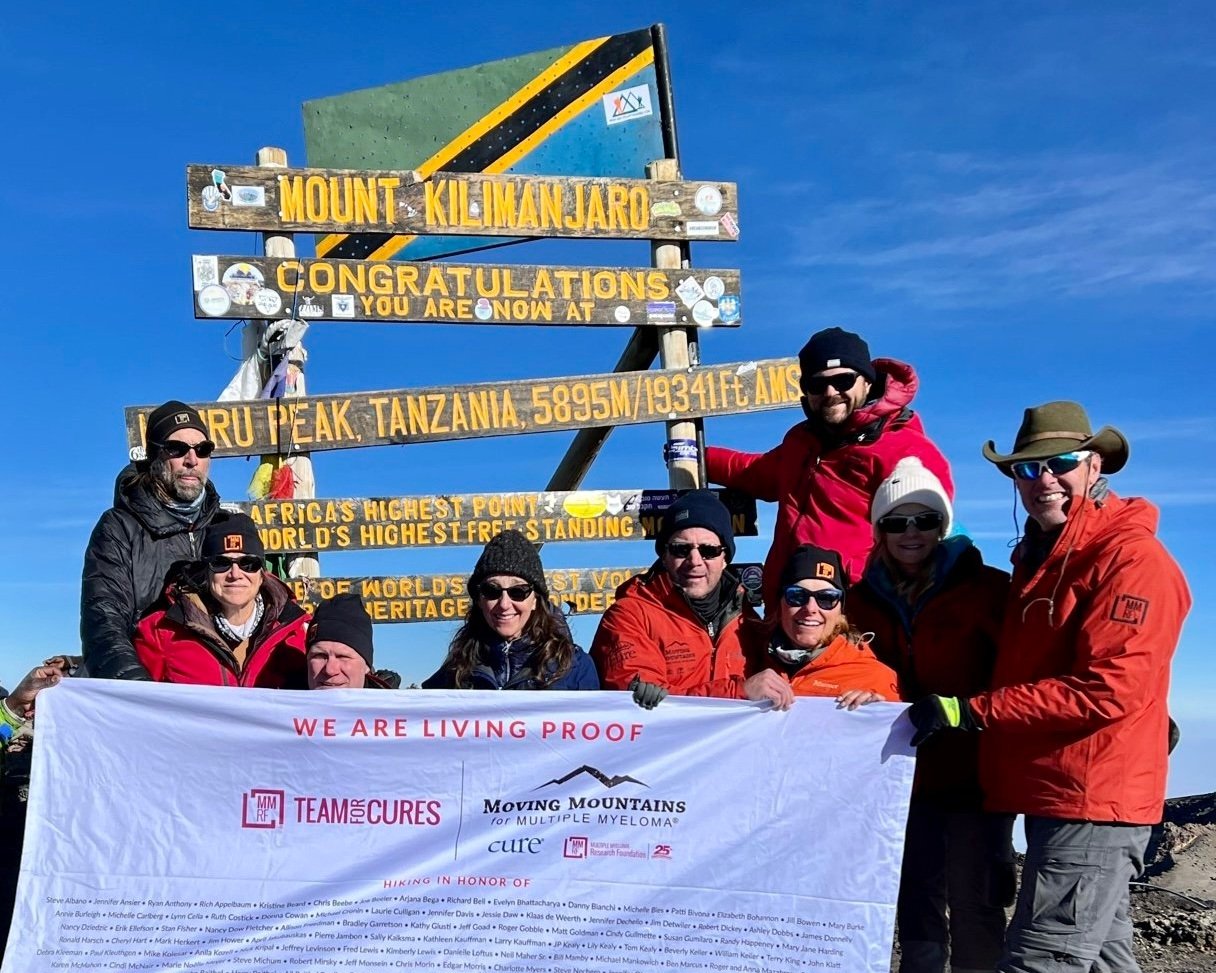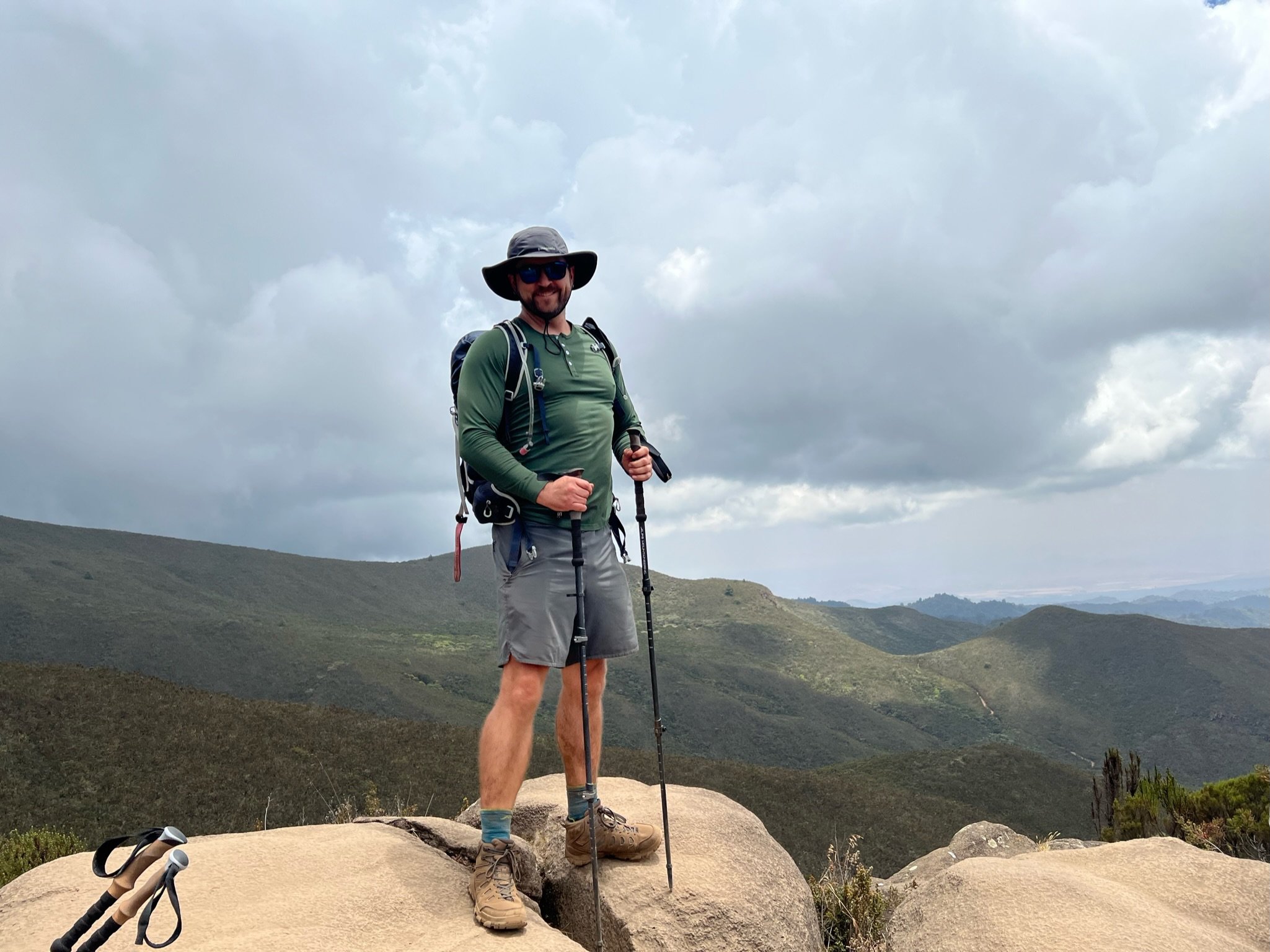3 life lessons from climbing Kilimanjaro with cancer survivors
Standing at the summit of Mount Kilimanjaro more than 19,300 feet above sea level, my mind was a maelstrom of emotions, memories and meditations. To arrive at the top of the African continent’s highest peak, I had ascended more than 12,000 feet over the course of seven days with about a dozen cancer survivors, caretakers and doctors. Throughout this time, we passed through five ecosystems — from dense forest and heather up through alpine desert.
My physical and mental exhaustion was a tribute to my dad, who has been bravely fighting a rare blood cancer called multiple myeloma over the past year. I was in Tanzania as part of the Multiple Myeloma Research Foundation’s Moving Mountains for Myeloma initiative. Together with over a dozen multiple myeloma patients, caregivers and doctors, we raised more than $200,000 to advance research for treatments and an eventual cure for multiple myeloma.
Stopping to take in some of the views along the Lemosho route on our way to Kilimanjaro’s summit.
Throughout many days of intense hiking and cold nights bundled up in my sleeping bag, I reflected on the many personal and professional changes and challenges I’d experienced over the past year — from my dad’s cancer diagnosis to starting my own business and where we are with the climate crisis. Getting to know many folks who are survivors of the same cancer my dad is dealing with both gave me hope for the future while also imparting on me a new perspective about life and work.
Here are some of the key lessons I learned climbing Kilimanjaro with cancer survivors:
1. Don’t leave your dreams for a day that may never come
Many of us don’t like to think about our own eventual demise. Instead, we delude ourselves into believing that we’ll most likely live to be 100, and that death and disaster is something reserved for others. In the United States, at least, it’s generally considered taboo or “depressing” to talk about death. Perhaps even reading these words makes you uneasy. Before my dad’s diagnosis, I certainly felt this way.
But we shouldn’t wait until the day we get bad news about our health to finally do the things we always wanted to do. Don’t leave your dreams for a day that may never come. While this doesn’t mean you should go spending your retirement savings or being irresponsible, it does mean stop using “being responsible” as an excuse to kick the can down the road on what you really want out of life.
I’ve always loved the James Dean quote: “Dream as if you’ll live forever, live as if you’ll die today.” In fact, I wrote this next to my senior portrait in my high school yearbook.
Many of my new friends living with multiple myeloma said that news of their diagnosis changed how they viewed their lives. They started to do things that they had long put off like travel, learning a new skill or prioritizing family. Life is brief and beautiful — factoring that into all of our decisions can help us make ones we won’t regret later.
Posing with some shrinking glaciers close to Kilimanjaro’s summit.
2. Go slowly to get where you’re going
While hiking Kilimanjaro, the guides and porters constantly reminded us to “go slowly” by saying the Swahili phrase pole pole. The best way to summit Kilimanjaro is to take it slowly so that your body has time to acclimatize and doesn’t burn out. Imagine if we did the same with life writ large?
In the United States, many of us are raised to believe that sloth is sin. We must constantly be moving or doing something productive. And if we can do it quickly, then all the better. The strangest phenomena about getting older is that each passing year seems to speed by faster than the one before. In many cases this is because we’re in such a hurry to get through the many obligations and activities each day brings – hustling at work to pay the bills, walking the dog, exercising, making dinner or if you have kids getting them to and from school and other activities.
But if you don’t take the time to slow down, life will pass you by. And sometimes slowing down will actually better help us get to where we’re trying to go.
3. Many things you worry about don’t really matter
In the stories of our individual lives, we tend to view ourselves as the protagonists. The good, bad and ambiguous things that occur seem important because they involve us. Sometimes we catastrophize about what could happen even if unlikely. Perhaps it’s something that went wrong at work — we made a mistake, failed to meet a goal or rubbed someone the wrong way.
Even if 95 percent of the things in our lives are going spectacularly, it can be easy to allow the 5 percent that aren’t going well to dampen our day. If we have meaningful relationships with family, friends and perhaps a romantic partner; a roof over our heads; food on the table; and, of course, our health, then we have most of what we need for a good life. And yet it’s hard not to fixate on things that really don’t matter in the long run — such as a bad boss, petty people or some of other source of negative energy in our lives. A cancer diagnosis gives you instant perspective, according to my trekking friends living with multiple myeloma.
And when you’re standing higher than most humans ever go, that 5 percent suddenly doesn’t matter so much. At the top of Kilimanjaro, I thought about all of the things I am grateful for — that I have a strong support network of friends, family and my partner; that I am able to engage in meaningful work that makes me feel fulfilled; and that I am currently have my health.
Walking across the Shire Plateau, with Kilimanjaro in the background.
Final thoughts
My father always says: “If you’re going to do something, do it right.” This doesn’t mean that you won’t make mistakes along the way. It means to bring care to everything you set out to accomplish, do the best you can and seek to always learn and grow. This is the attitude I brought to my training for Kilimanjaro, and what motivated me step-by-step up the mountain.
Now that I’m home and back to work, I’m making a conscious effort to remember the lessons of Kilimanjaro and the people I met along the way. I’m grateful for the life I’ve been able to lead so far — and while I don’t know how long I’ll be here for, I'm determined to make the most of it while it lasts.





